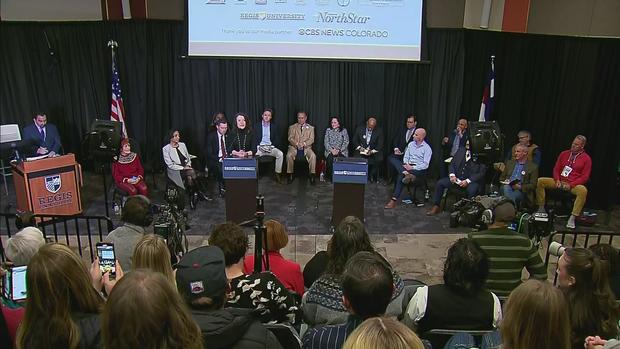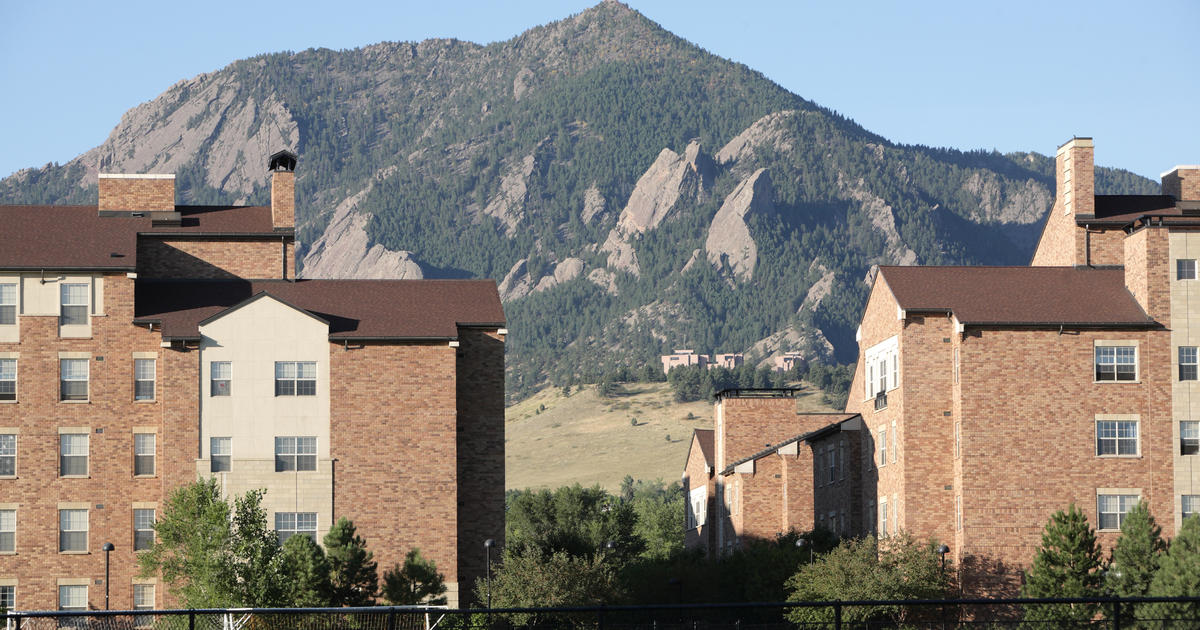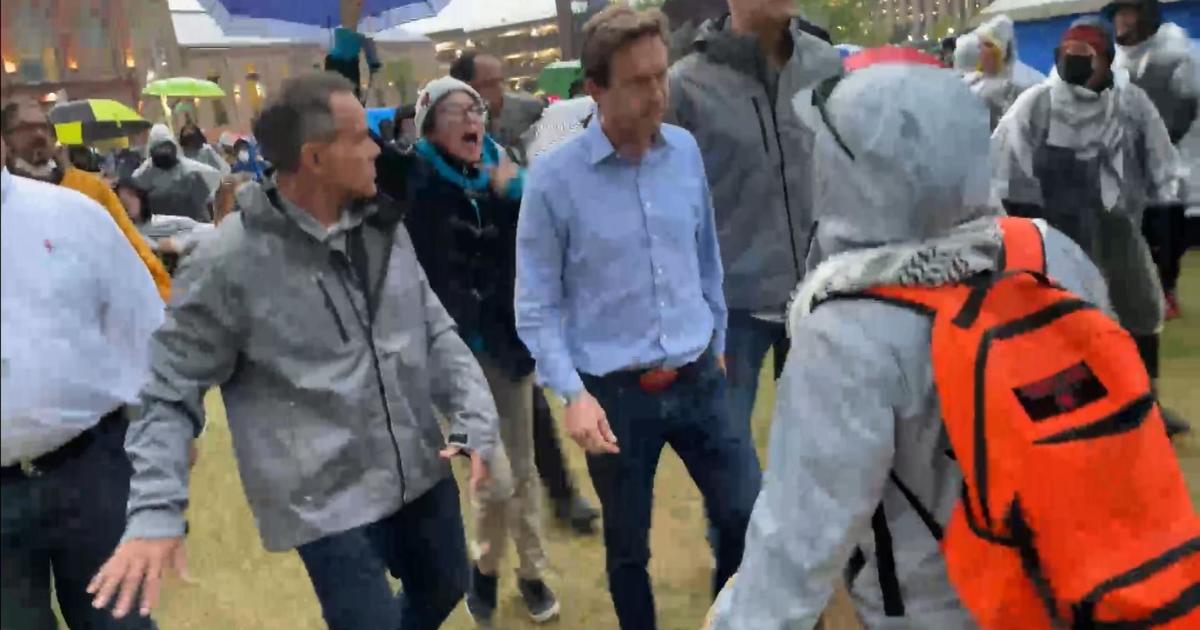Denver mayoral debate: Candidates address plans for affordable housing
Local elections in Denver will take place in less than two months. Among the races that voters will decide include mayor, city council, city council at-large, auditor and clerk and recorder.
The race for mayor will likely be a heated one, with 17 people in the running as of Dec. 4.
On Thursday, CBS News Colorado was the media sponsor of the first mayoral debate, which took place at Regis University.
All 17 candidates were invited, and all of them participated except Al Gardner, an IT executive who's served on several city boards, because his daughter had a baby earlier that day.
Ballots for this election will start getting mailed out March 13 and the last day to vote will be April 4. If no candidate wins more than 50% of the vote, there will be a runoff election on June 6.
Due to the number of candidates, CBS News Colorado Democratic political analyst Mike Dino says candidates might only need 20% of the vote to make it to a runoff election.
Mayor Michael Hancock's term is about to expire and he can't seek another due to term limits.
A full list of mayoral candidates so far includes the following:
- Renate Behrens
- Kelly Brough
- Lisa Calderón
- Al Gardner
- Chris Hansen
- Leslie Herod
- Mike Johnston
- Aurelio Martinez
- Deborah "Debbie" Ortega
- Terrance Roberts
- Trinidad Rodriguez
- Andy Rougeot
- Kwame Spearman
- Ean Thomas Tafoya
- Robert Treta
- James Walsh
- Thomas Wolf
The debate covered some of the topics front and center on most Denverites' minds. Those topics included affordable housing, homelessness, crime, transportation and environmental issues.
All 16 candidates in attendance were able to speak on each topic, which made for a lengthy debate with responses capped at 30 seconds each.
On the topic of housing, the moderator asked what candidates planned to do about the cost of housing, specifically for new college graduates entering the workforce in Denver.
Rodriguez, a finance professional and former policy adviser for the Colorado Department of Natural Resources and Colorado Governor's Office, said he would "accelerate" the construction of more and different types of housing.
"Diverse supply and more total supply," he said. "We also need to work on opportunities to boost total income."
In a rebuttal, Treta -- a contractor, builder and architect -- asked Rodriguez why, in his position at Blueprint Denver, he didn't consider allowing more accessory dwelling units -- such as mother-in-law suites, casitas, backyard cottages or garage apartments -- which Treta says would have increased housing density in the city.
Rodriguez said research into accessory dwelling units at the time was still in early phases and shot back saying the real issue is incomes among Denverites, not housing density.
Given the same question, Herod -- a Colorado state representative since 2016 -- said she moved to Colorado when she was in high school. The CU Boulder graduate said she would not have been able to afford to live in the metro area at the time if she had to pay today's prices.
She supported building more diverse types of housing and on land underutlized by the city and county of Denver, such as land owned by Denver Public Schools and RTD, "so [young people] can afford to live here and thrive."
Wolf, an investment banker who ran for mayor in 2011, said we need to increase the supply of housing to meet demand, which he would do, in part, by expediting the approval process in the planning and zoning committee.
Asked for specifics of his plan by Trata in a rebuttal, Wolf said he would introduce more artificial intelligence and machine learning to the building permitting process, saying permits should be "a rubber stamp."
Ortega, a Denver city councilwoman at-large and Denver Homeless Commission's first executive director, said she would also reform the building permitting process, saying there are many affordable housing requests that need approval.
She also said she would support the construction of more manufactured homes on public land, which she says would bring the overall cost of housing down by 40%.
Asked how her plan would reduce costs so much, Ortega touted a company that the city already works with that she says can build manufactured homes at close to 40% of a comparable home, and that building on public land would cost even less than 40% of buying private land.
Roberts, a former gang member-turned-activist, asked Ortega her thoughts on public and social housing and a public banking system to help pay for it. Ortega said some of the city's money could be put in a public bank, but much of it is "tied up" already. Roberts also said we need rent control.
"I think this is an opportunity to look at how we can do things differently," she said.
Tafoya, civil rights and environmental justice leader and co-chair of the Colorado Environmental Justice Action Task Force, said the previous candidates were failing to focus on people in their responses.
"I just heard four people answer this question and I don't think any of it was centered in human beings," he said, and then suggested boosting financial literacy, investing in nonprofits who work on financial literacy and offering incentives to people like housing vouchers.
Calderón, the executive director of Emerge Colorado and a faculty member at Regis University and CU Boulder, said the city needs to strengthen renters' rights and renters' assistance, since about half of Denverites rent: "We need to make sure we have a permanent fund to assist people in paying their rent."
She also said senior homeowners need more protection from abusive HOAs and other bad actors.
Walsh, a history and political science professor at CU Denver, said the more important question to ask is a broader question about wealth inequality in the city, saying he'd be a mayor that helps get people the resources they need, "which means union density, a universal basic income program that's expanded, it means a minimum wage that's a living wage."
Spearman, who owns the independent bookstore Tattered Cover and sits on several city boards, was asked about making housing more attainable for the middle class, who make too much money to qualify for affordable housing programs, but not enough for many homes.
He pitched a program dedicated to providing workforce housing, subsidized by the city. "If you're a nurse, a teacher, a book seller, a police officer, a firefighter, you can no longer afford to live in Denver," he said.
Behrens doesn't have a website, and little appears to be known about her professional background, but she recommended converting older unused buildings in the city into housing, having employers play a bigger role in workforce housing and building more accessory dwelling units.
"For the young people in Denver, I would like to change the rules about mother-in-law apartments so that everybody that has enough ground can add one or two apartments to a single home," she said.
Rougeot, an Army veteran and owner of a small maintenance company, said he would rework the permitting process, eliminate regulations that drive up costs and "not [let] corruption and money" get in the way of affordable housing.
Johnston, a former state senator, was asked if he supported rent control, to which he said no: "We can build 25,000 permanently affordable units in this city, and what that means is that anyone that lives in one of those units never has to pay more than 30% of their income on rent, and that means your rent doesn't go up unless your income goes up."
Hansen, a current state senator, also opposed rent control, saying "rent control, in every city, that it's been used in, immediately stops the supply and stops the investment."
Brough, a former head of the Denver Chamber of Commerce and former policy analyst for city council, also said rent control has not worked in any city it's been tried in, and instead pitched a plan to convert unused office space into residential units. She also said she would build for-sale condo units on publicly owned land.
Martinez, a former boxer who owns a business center in Denver, broke from the previous candidates, saying we do need rent control: "There has to be a cap on that situation."
Due to the number of candidates and length of the debate, CBS News Colorado will provide similar recaps on other portions of the debate in the coming days.
You can watch the full two-hour debate here.
For more information on all the candidates, voting locations, voter registration status and more, click here.





